25th October 2016, Guilin
Okay everyone, I’ve realized I have woefully neglected the English tag. And in all honesty, the only reason for me to write something today is that we decided to do a quiet day at the hostel, and the wifi isn’t working. So after having slept in, eaten an unhealthy amount of dumplings, having gone to Chinese foot massage (oh sweet heaven) and watched the rain falling on the lake, I am now resorting to updating the English tag. That’s how far it has come…
Since we leave for Vietnam in three days, this will be a rough summary of pretty much our entire time in China. We have been to some pretty cool places in the meantime, some of which we liked more than others.
After leaving Beijing, we spent two nights in the most picturesque ancient town of Pingyao – this is what we imagined ancient China to look like. The entire old part of the city is perfectly preserved with its one or two-story houses of gray brick, small alleyways that are crammed with shops and street vendors and red lanterns, and surrounded by an entirely intact city wall. We took one and a half days just strolling around the streets, eating our way through the food stalls and walking along the perimeter of the wall. Our hostel was inside one of the old courtyards with a very nice family; we had a traditional room to ourselves which basically consisted of a very large bed that was connected to a stove so as to warm it up from the bottom in the cold season (which had not yet started). The bed was insanely hard with a one inch mattress but it was spacious enough for four to six people.
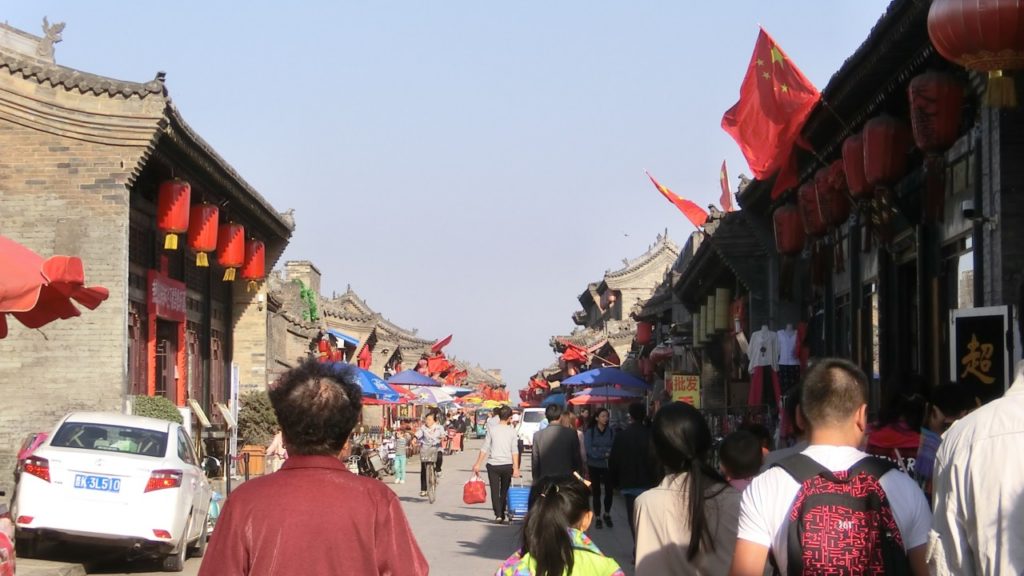
Pingyao by day…
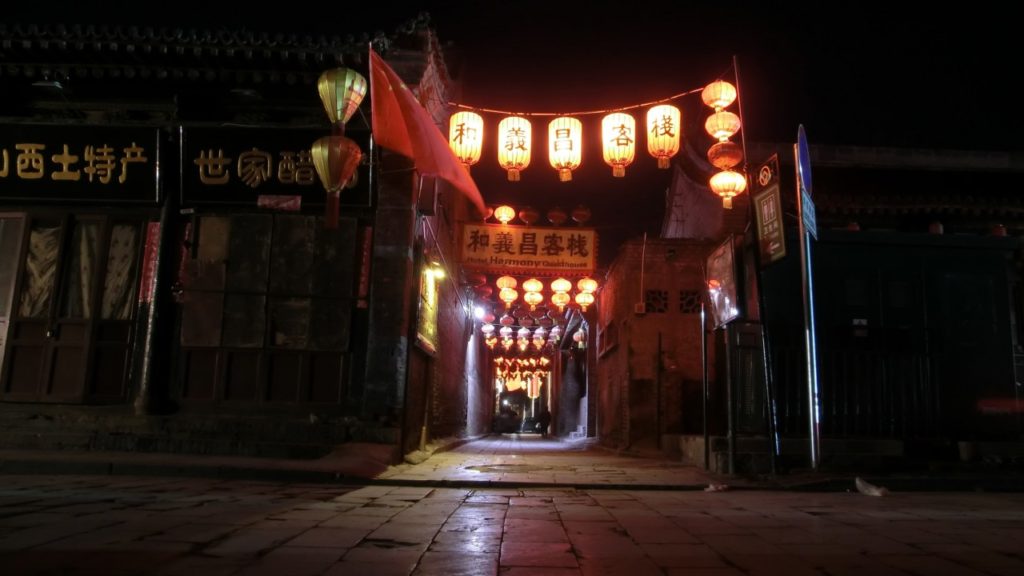
…and night
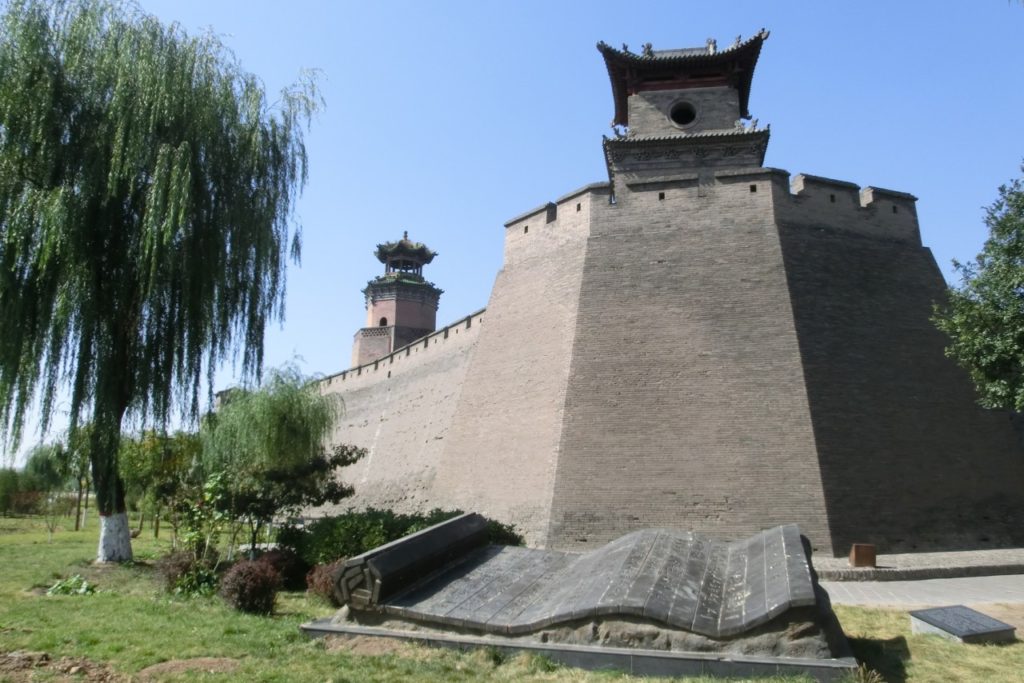
The impressive city wall with two of its guard towers
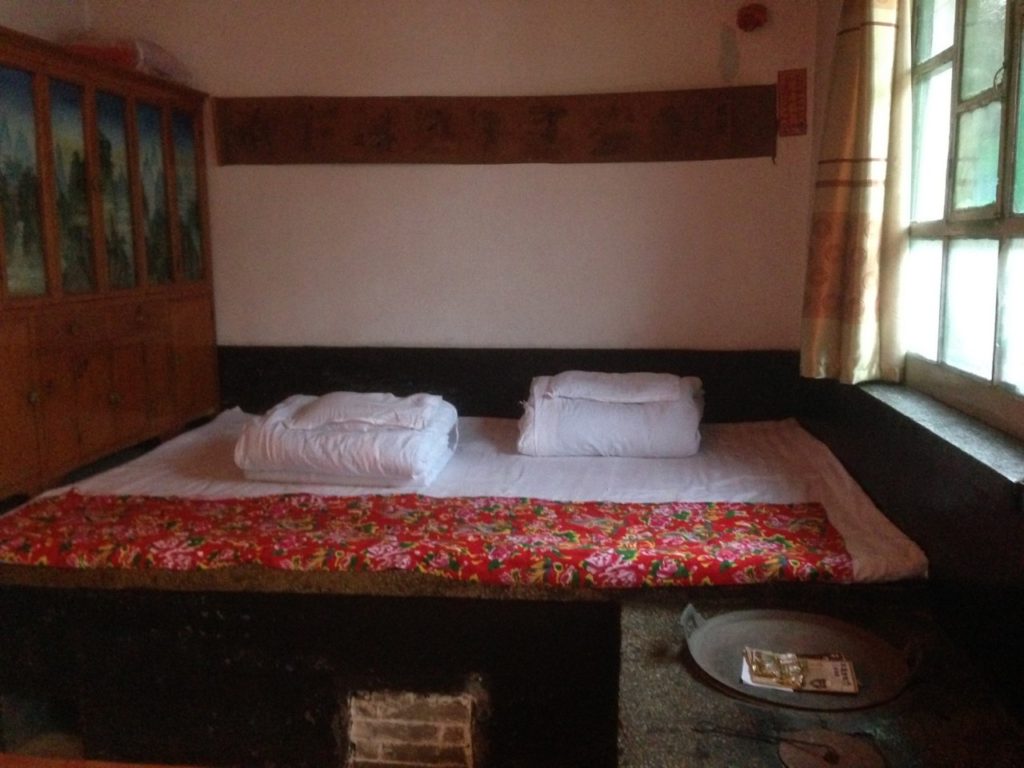
The Bed
From Pingyao, our journey led us to Xi’an. Unfortunately, we had gotten standing tickets for the train ride but only realized it at the time of boarding the train. Luckily, it was only a three-hour ride and we were able to sit on empty seats half of the time.
In Xi’an, we didn’t really do much since we were both still recovering from our head colds. A large portion of the time was spent in the very busy Muslim quarter which was bustling with food stalls, selling all sorts of exotic snacks that were somewhat different from the average Chinese foods. Our favorites were kaki fruit pancakes (Kathrin) and sticky yellow cake soaked with rose water (Birgit). They also sold different kinds of bread, pita, kebab and the like which seemed rather oriental.
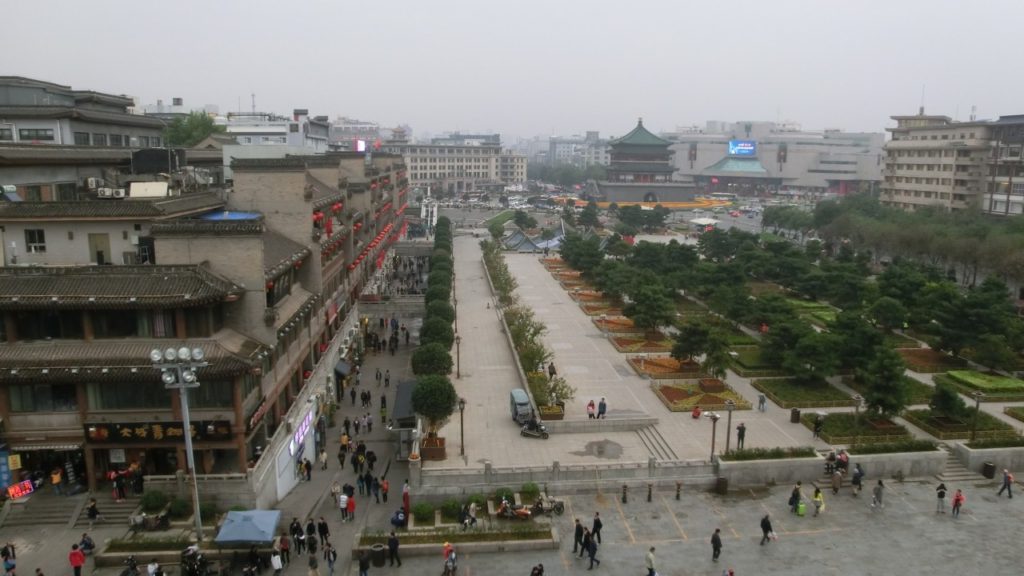
Xi’an as seen from Drum Tower
Our friend Mak arrived two days later than us and we spent most of the time together then. A friend of his got us tickets for the terracotta soldiers and we ended up getting invited there in spite of the insanely expensive ticket price. The soldiers are the most important sight around Xi’an and a must-see on every China travel. All their faces and attires are different, not two of them are alike, and they also differ in rank and position; some even come with horses and carriages. When they are excavated, they are completely in ruins and reassembling them might take several years. The ones that you usually see on the pictures represent only a small portion of the army – it is estimated that a total of up to 6,000 soldiers will be found in this area. We took several hours strolling through the excavation sites, and afterwards Mak’s friend, who had gotten us the tickets, even invited us for dinner together with his family. We drove to a restaurant close to the army, and had a hearty stew with lamb and beef, glass noodles and short, thick noodles in a hearty broth – one of the most delicious meals I’ve head in China. It was a very interesting evening talking with Mak and his friends.
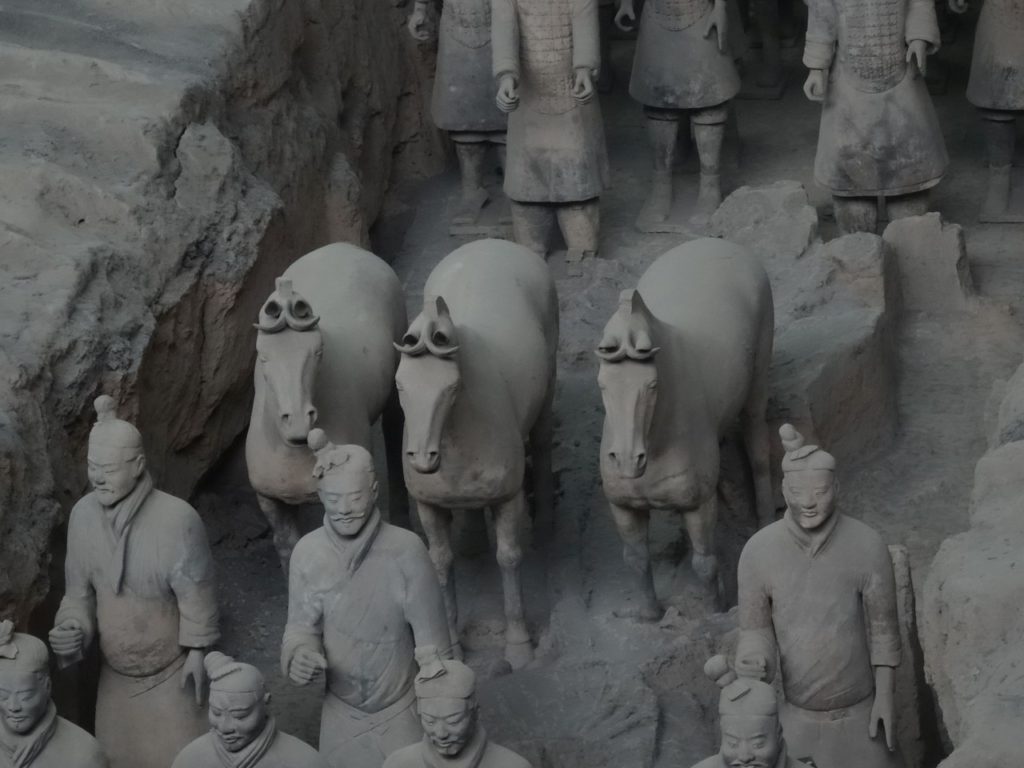
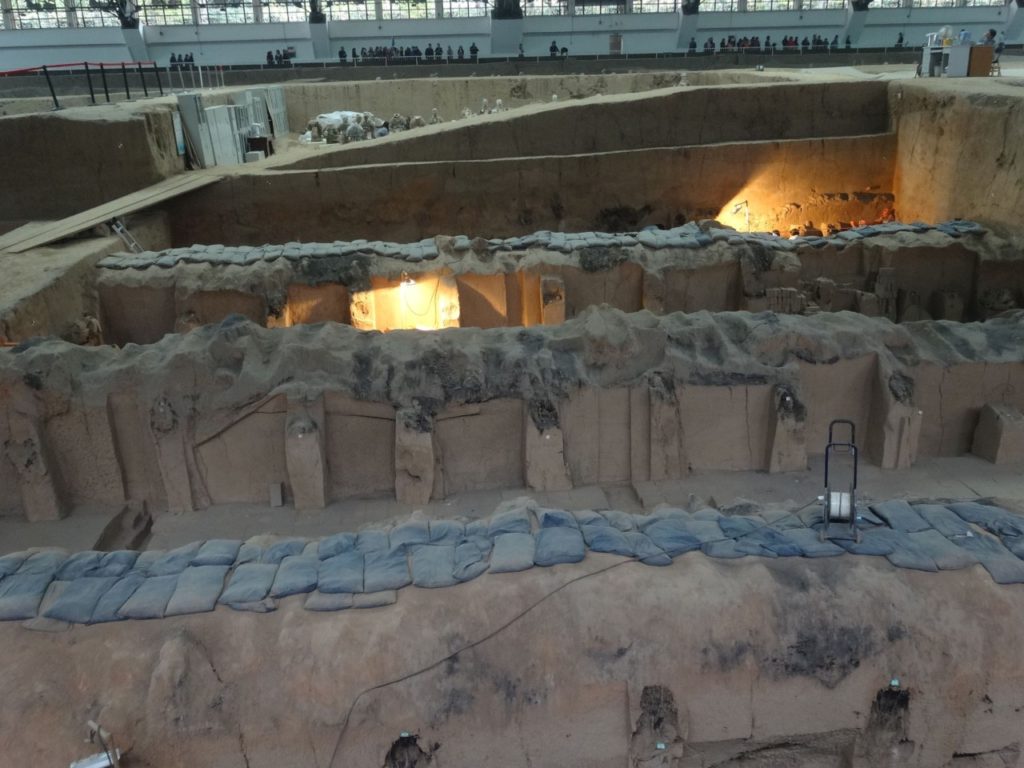
Excavation of the soldiers is ongoing
From Xi’an, we took an overnight train to Chengdu. Since all the sleepers were already sold out, we decided to take hard seats, figuring that it wouldn’t be much difference to spending a night on a long-haul flight. While the seats are not that hard in spite of what their name suggests, they cannot be reclined (this only works in the high-speed trains), so we ended up sitting straight or slumping against each other for twelve hours. Also, the train was full, with the lights on all night and people making noise from playing cards or watching movies on their phones. The smoking which was allowed in the space between the cars was our smallest issue. But we survived and it definitely hardened us for future train rides that were also not comfortable by German (or Transsiberian) standards but we could always reminiscently tell each other: It’s still not as bad as a night on a hard seat… >_<
Apart from that, Xi’an South station is probably the most inconvenient train station we have ever had the misfortune of coming across. Located in the middle of nowhere, tiny, cramped, old, with no electronic boards or any other non-Chinese friendly means of information, we ended up standing in the hall for almost two hours since our train was late and we didn’t even know what was happening. If it hadn’t been for friendly locals whom we showed our tickets and who made sure that we’d get on the right train, we would have been totally lost.
But then we got to Chengdu, and what can we say, our crops were watered and our livestock was fed. The information in the guidebook said there was nothing to do but everyone left the city happy and with recharged batteries. We suspect it might be the very lack of things to do that achieved that result, in combination with Chengdu’s secret weapon: the world’s biggest panda breeding facility. That was really our only reason to visit and we were totally not disappointed. Not only is the park delightfully panda-friendly instead of the usual Asian zoo nightmare but also did those adorable, fluffy, clumsy furballs have babies – twenty-three babies!!! – that were even more adorable, and even fluffier and clumsier than their parents. We spent six hours in the park since there were also Red Pandas to see, and also it was just a really beautiful park.
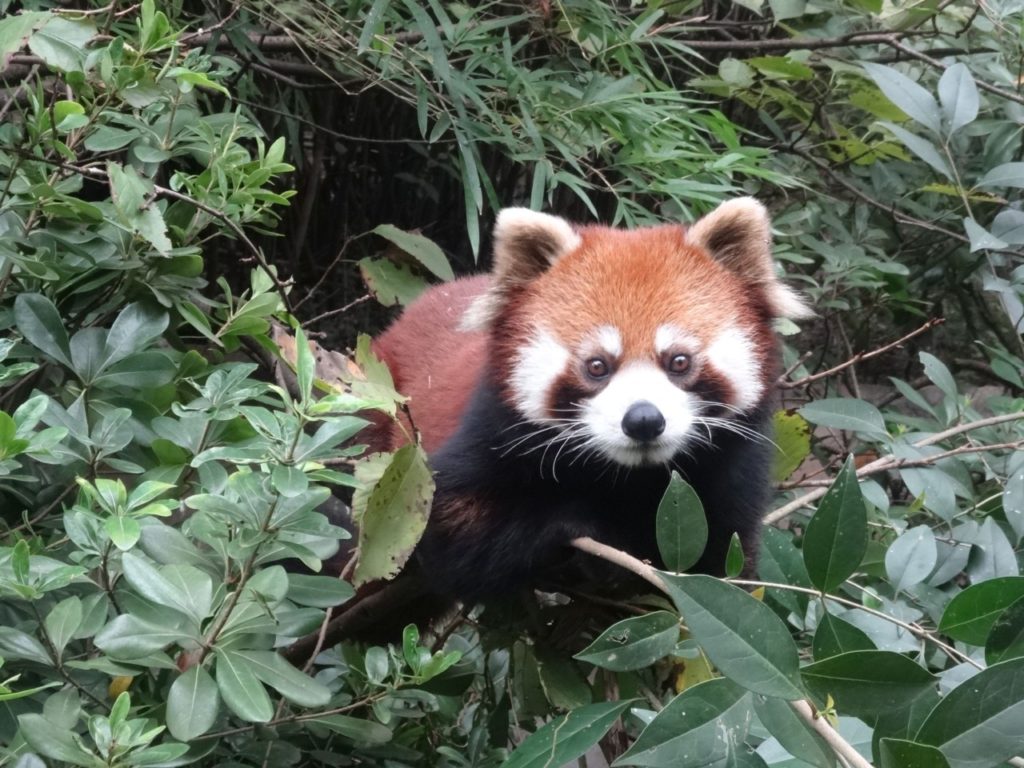
Welcome to the Panda Park!
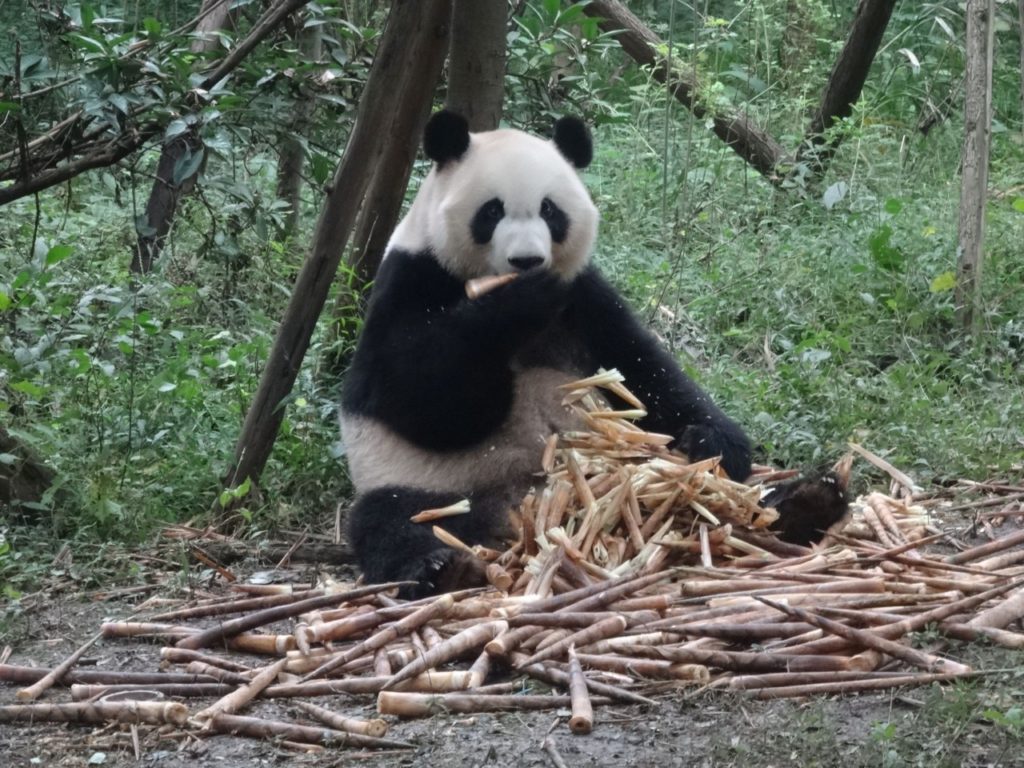
I love bamboo…
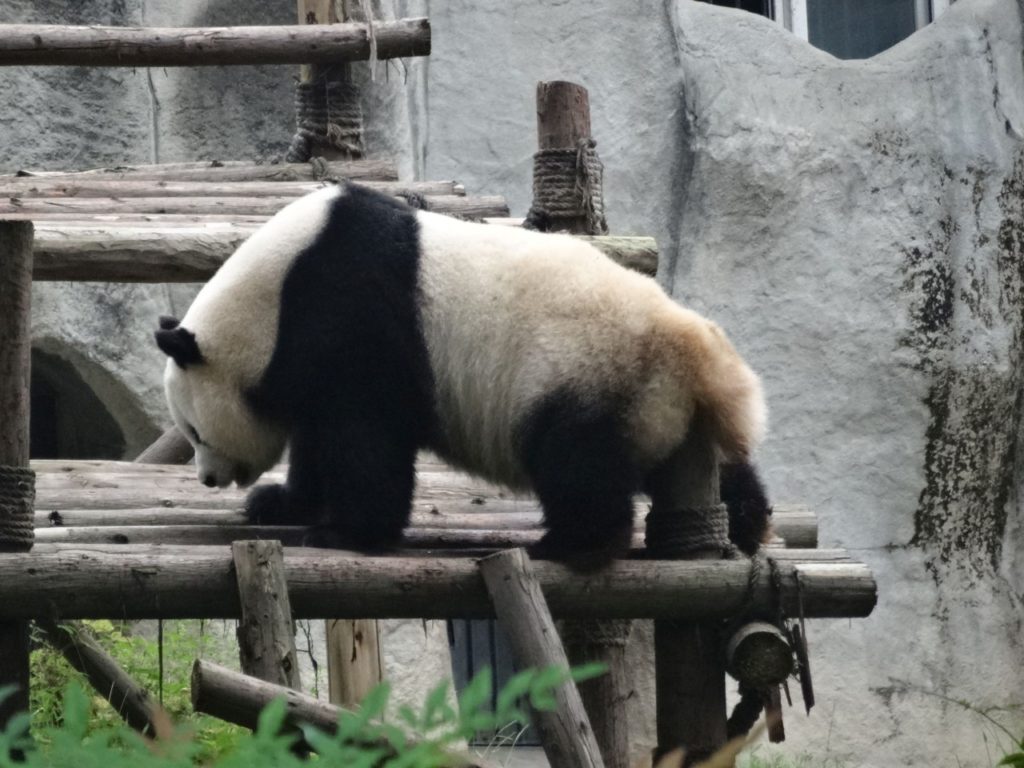
…scratching my behind…
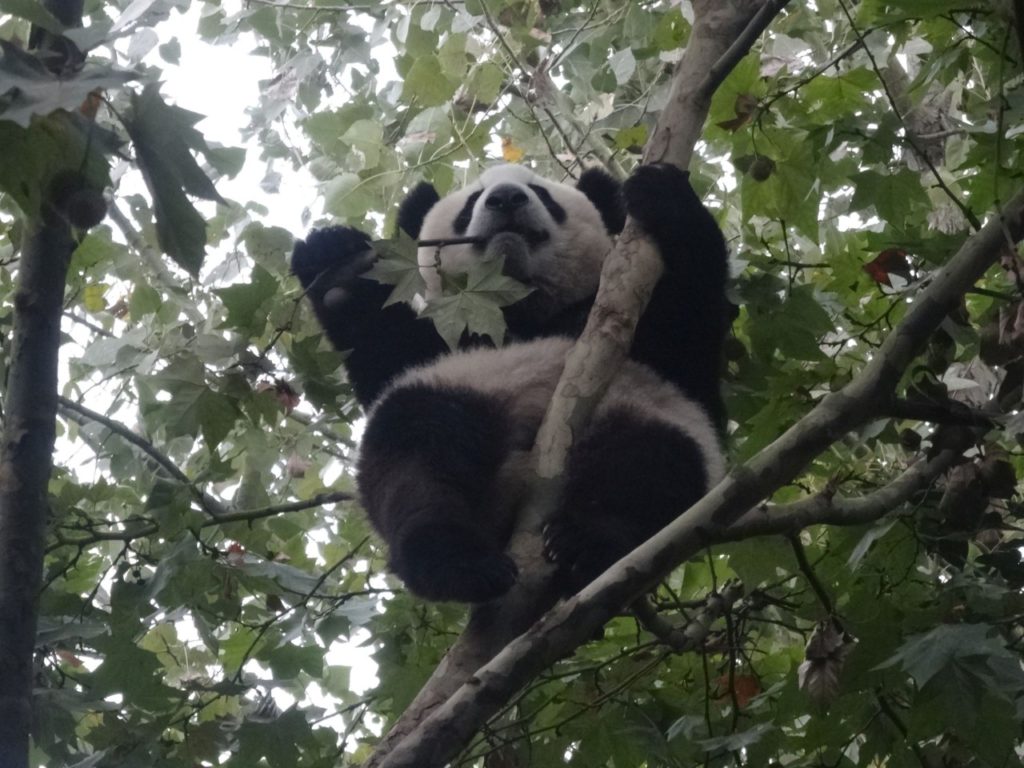
…and climbing trees! Wouldn’t have guessed that, would you?
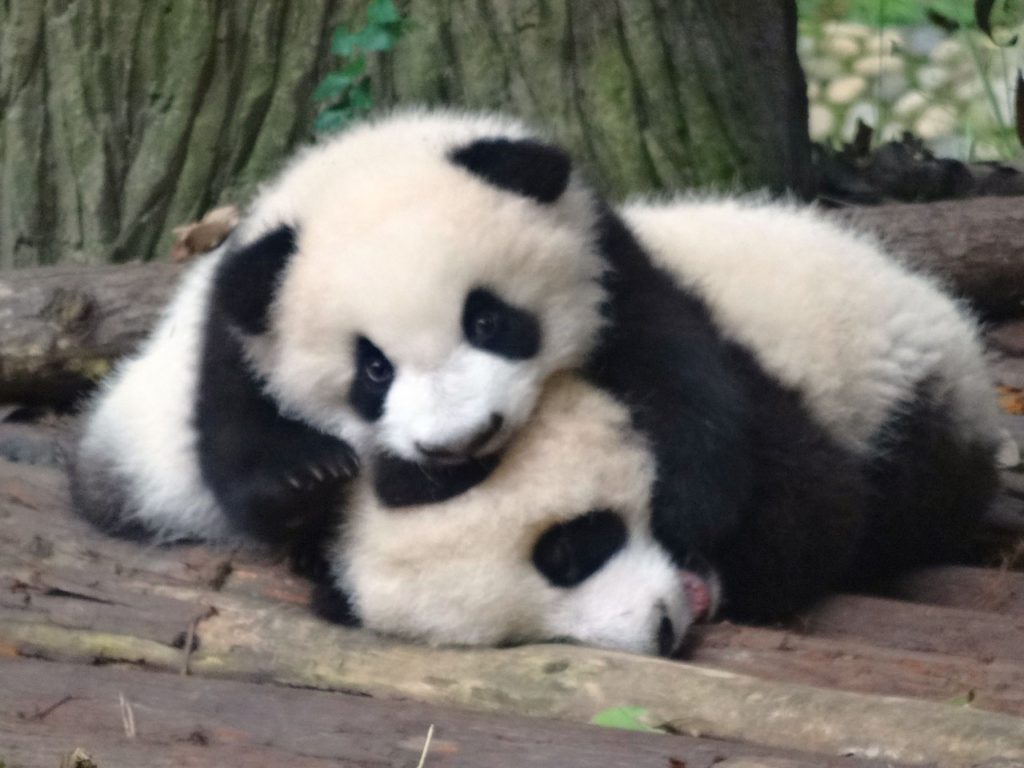
Look at ‚em! Aren’t they the cutest little things you ever saw?
The other highlight in Chengdu was spending a Saturday afternoon in People’s Park which is really just that: a park where the locals go to spend their Saturday afternoon – to drink tea, play chess, practice calligraphy on the ground with giant water-soaked brushes, dance, sing, get their ears cleaned by a professional ear-cleaner, or discuss the newest offers on the wedding market – a somewhat secluded pathway littered with sheets introducing the unfortunate young ladies and gentlemen in their absence…
Our hostel in Chengdu was an apartment run by two young men and it was almost like a home away from home. The owners literally went out of their way to help us with booking our onward trains, even accompanying us to a travel agency. They made a lot of tea for us and brought us the most delicious cookies, and it was a very relaxing atmosphere.
So, happy and with recharged batteries just as the guidebook had predicted, we set out for a 30-hours journey including an 18-hours overnight train (this time hard sleeper which was softer than it sounded but still hard by any means), a five-hours hard seat ride on another train and one and a half hours on a minibus (the rest of the time was spent waiting at train and bus stations) into a tiny village by the name of Yangjiajie at the foot of the so-called Avatar mountains. They are so called because some people claim that James Cameron drew inspiration for Pandora’s floating peaks from these mountains.
We’ll never know if this is true but what we can say for sure after two days of hiking and riding buses through Zhangjiajie Scenic Park (which is the official name of that area) is that this is one of the most stunning landscapes we have ever laid eyes upon and boy do those mountains look like they’re floating when their foot is covered in clouds and the ever-changing mists create a new view with every blink of an eye.
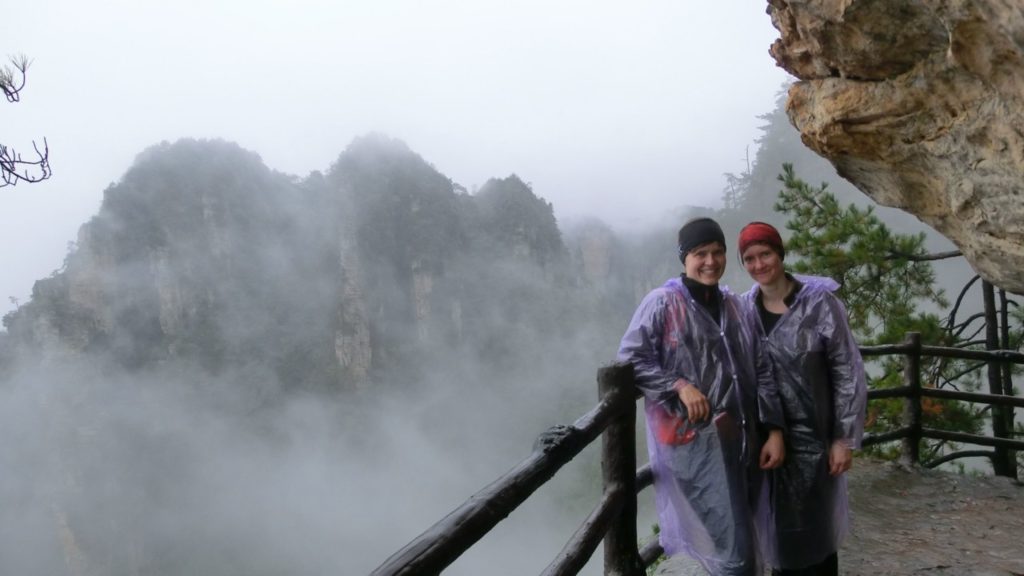
Garbage bag raincoats like proper Chinese tourists!
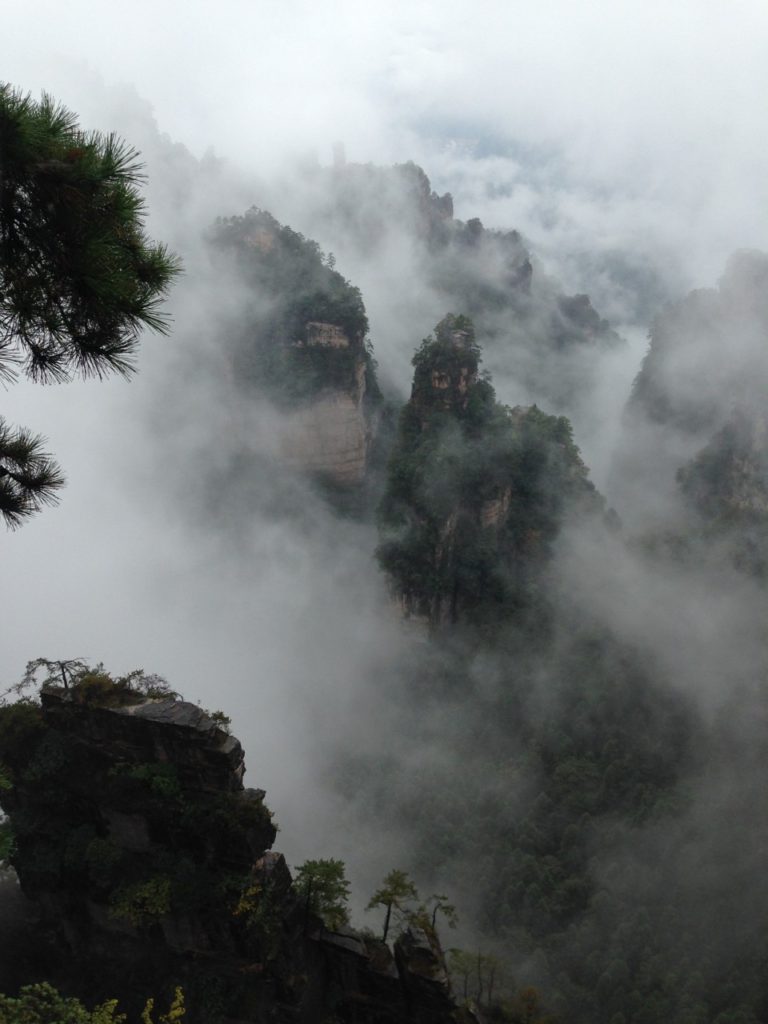
A view like a Chinese ink drawing
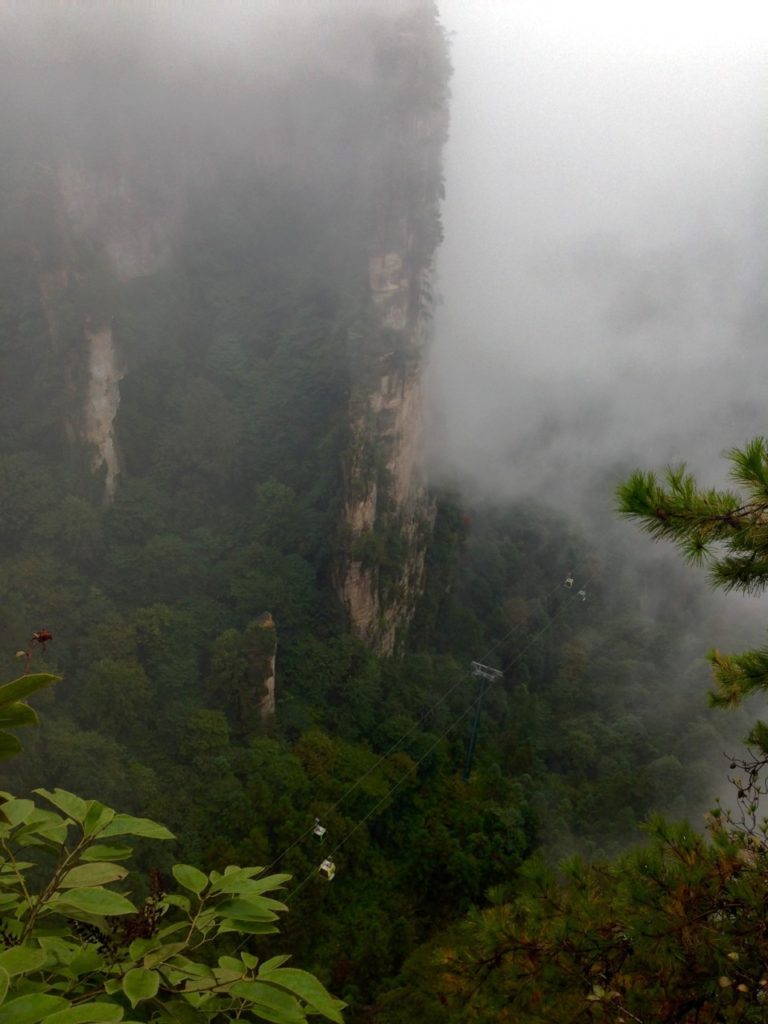
Look at the size of the cable cars in comparison!
To be fair, we did have a lot of fog and even rain and we didn’t get to see the highest peaks but that did not diminish our experience. Apart from the splendid views, we also enjoyed what is probably the world’s smallest Ferris wheel (also the one in the most unlikely location: under a precipice to the side of a steep valley in the middle of the forest; built from wood and operated entirely manually by an old man), and we had great company from Liverpool, Rob and Lorna, who really knew how to turn a dull one-hour downhill climb on slippery steps into a fun game of “Who or what am I”.
To top it off, we stayed in the loveliest, friendliest little hotel at the outskirts of the village. The owner, Lilly, gave us invaluable advice on how to make our way around the park and basically planned out our entire stay for us. We had a double room to ourselves (own bathroom, yay!), the air was clean what with the entire place being surrounded by forests, rice fields and rivers; and the only noises to be heard were the chickens‘ busy bantering in the morning. And the food, don’t even get us started on the food! Lilly was such a good cook; we ended up taking all our meals at the hotel since there was simply no reason to go to the village. Our favorites were the scrambled eggs with wild onions, the fried eggplant, the lotus root, and the buns and noodles that she served for breakfast.
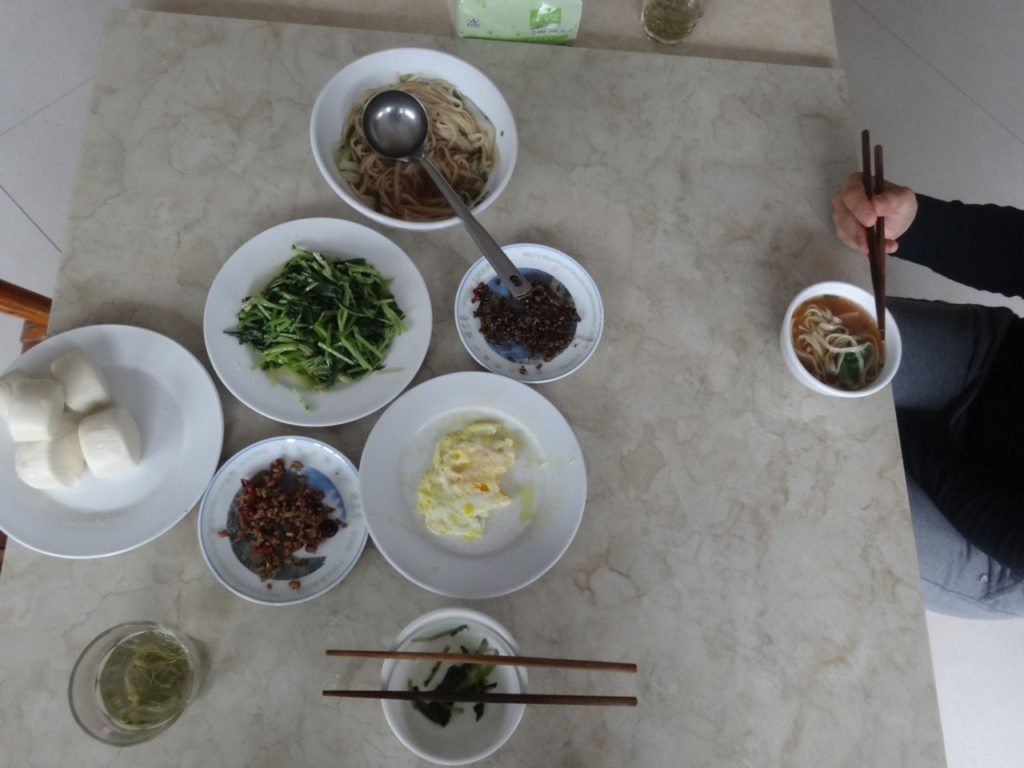
Delicious breakfast
But everything comes to an end someday, and we had to leave far too soon to go to Guilin, which was another twelve hours hard sleeper and another hour on a high-speed train. Guilin greeted us with a sunny 32°C and a hostel directly by the lake-side.
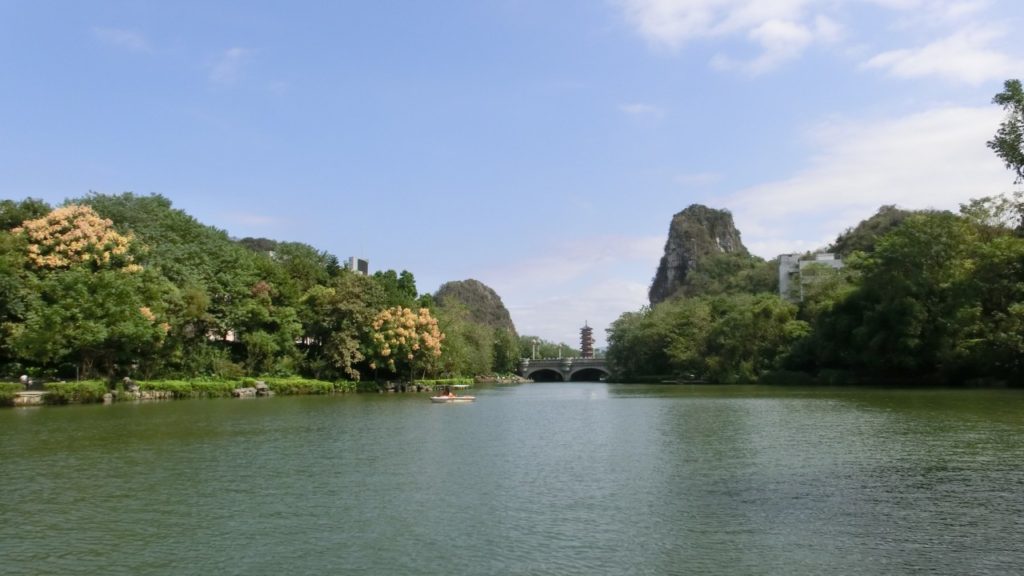
One of the lakes right in front of our door
We took one day to go on a River Li cruise which is incredibly famous for its peculiar rock formations. It was a guided tour, and the cruise on the “bamboo rafters” (rather metal-pipe rafters but doesn’t bamboo sound so much more romantic…) was nice enough inspite of the mist which seems to be our curse for all the main sights in this country but the rest was what you’d probably call “spoilt by tourism”. We only walked around the old town of Xinping and didn’t even go to famous Yangshuo town because we’d seen enough of Chinese tourism after a half-day, and luckily, a very friendly Chinese girl who also booked herself out of the tour earlier helped us to get back to Guilin. Apart from that, we enjoyed some street food in Guilin and I (Birgit) also got a Chinese foot massage which was really good. We wandered around the lakes on very lovely little pathways but apart from that we didn’t really do much since everything in China seems to come with a price tag (the Longji rice field hike would have cost us 40€ each).
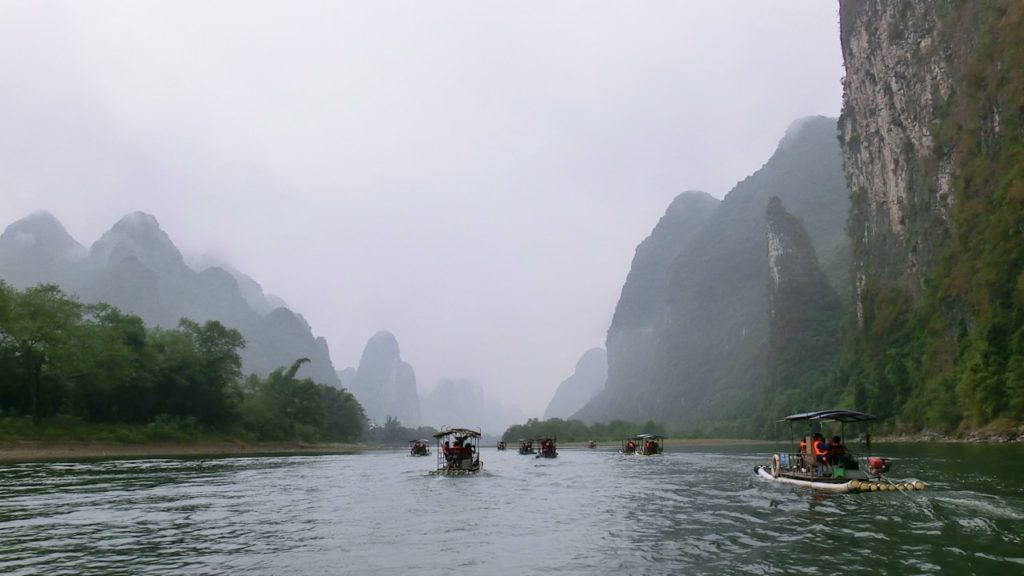
River Li cruise in the mist
Now we are on the way to Nanning from where we intend to cross the border to Vietnam on Friday, 28 October. Fingers crossed that we get tickets for the bus since it was not possible to book them online in advance…
